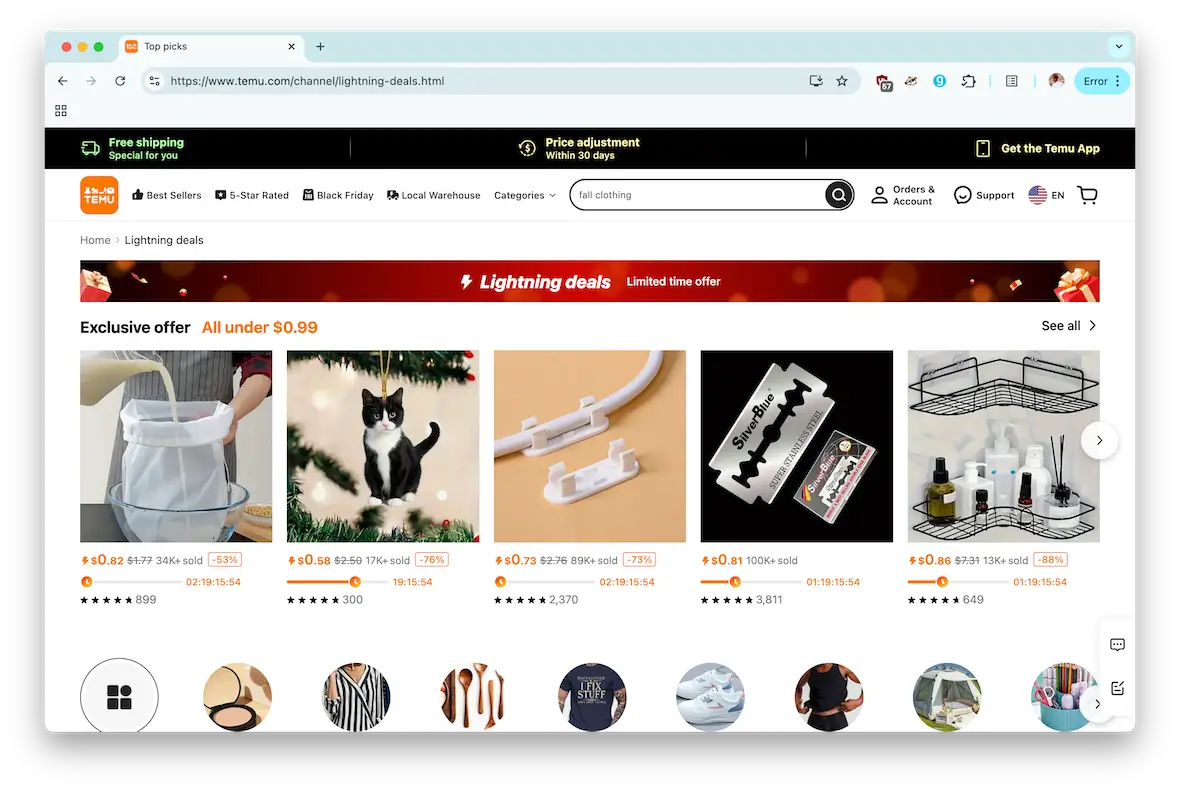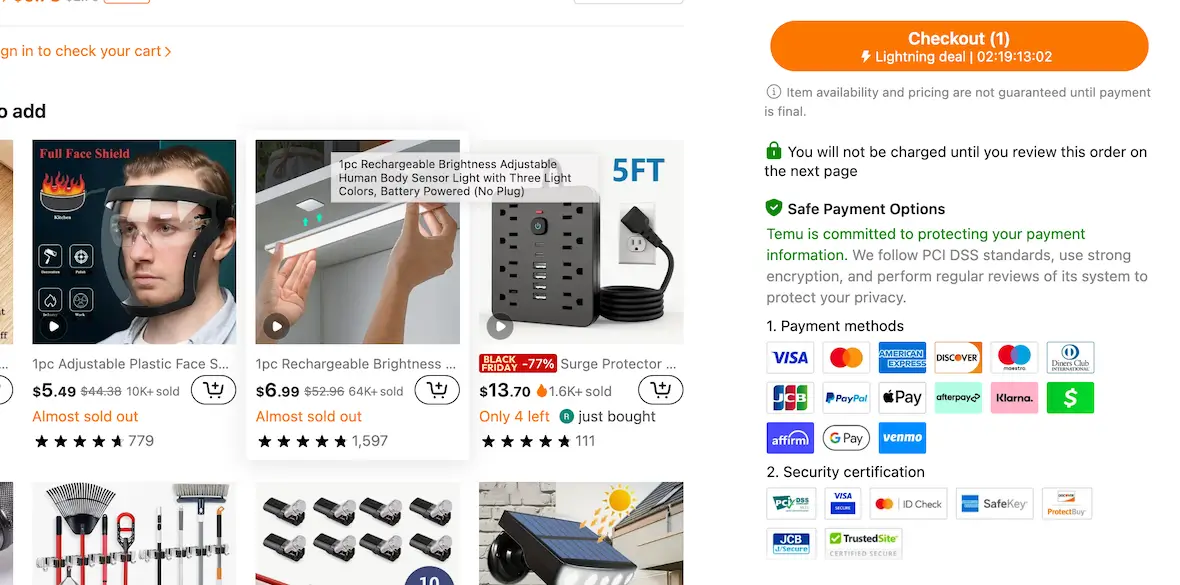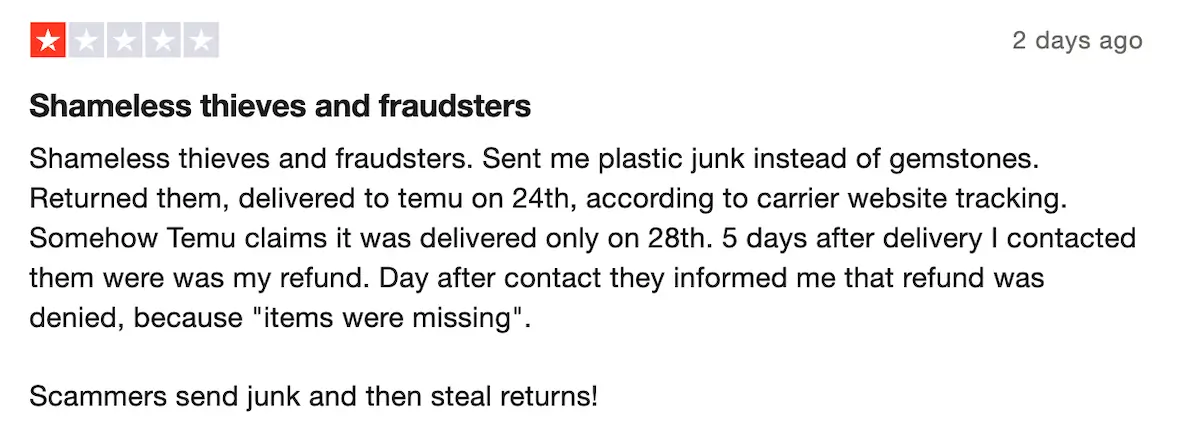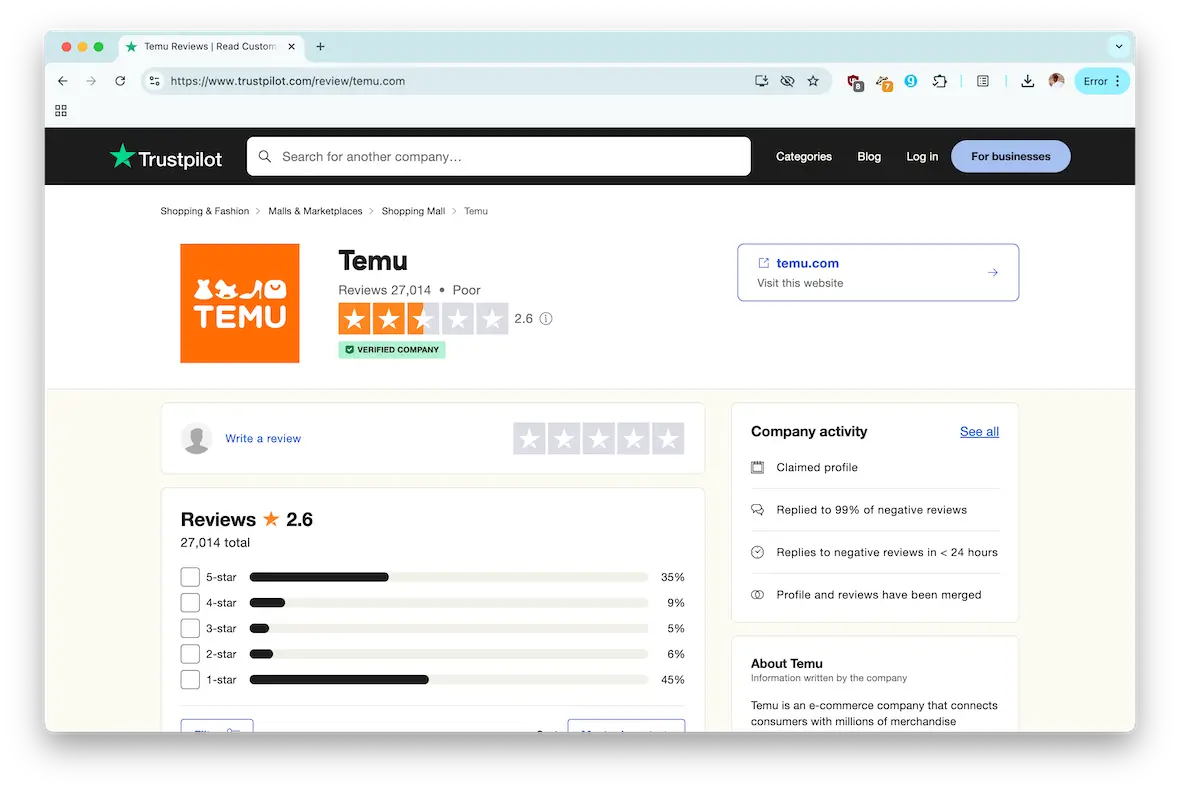You can hardly visit Facebook or Instagram these days without a China-based discount store offering you all kinds of bargains. Presently, the one that is most likely to pop up on your feed is Temu. But what exactly is Temu? And is Temu safe to buy from?
What is Temu, and how does it work?

Temu is a China-based online store that focuses on selling low-cost items. Using a combination of special deals and promotions, shipping directly from China and from local suppliers, Temu offers prices that non-Chinese shopping chains can’t compete with.
Temu advertises heavily on social media and aggressively pushes people to install their app. They do this by offering extremely cheap deals if customers buy through the app.
As of mid-2024, the Temu app has been downloaded more than 50 million times, making it more popular than the Amazon shopping app.
Block apps from sending your data to China
Temu is comparable to Shein, a similar Chinese e-commerce company. Both companies have a similar business model. And both have faced allegations of forced labor practices and sub-standard products. Temu has also been found to be evading paying US taxes on its sales.
Is Temu a legitimate company?
The rapid rise of this new retail giant has caused many people to wonder about its authenticity. So, is Temu a scam? Or is it legit?
Temu is a legitimate company. The platform is owned by the parent company PDD Holdings.
Temu’s exact worth is unknown since they’re under no legal obligation to open their books. Saying that, they have now surpassed Alibaba as China’s biggest and most profitable e-commerce company.
Is Temu safe and secure for online shopping?
When you buy from any online store — especially international stores — it’s natural to worry about whether or not it is safe and secure. Will you get what you ordered? And is your payment information safe?
The answer is yes. Temu is just as safe and secure as any other online store. Let’s break down why.
Temu uses secure payment methods

Is Temu safe to use a credit card with? This question may have you hesitating to enter your payment details into Temu, but did you know that they also accept PayPal, Apple Pay, and Google Pay?
The advantage of additional payment options is that PayPal offers buyer insurance protection on all transactions. Plus, all 3 of these alternate payment methods keep their user’s payment details on their servers, not on Temu’s.
Temu has an HTTPS-encrypted website
Before buying anything from anyone, you should always confirm that the website’s URL starts with HTTPS and not HTTP.
The S at the end of HTTPS stands for “secure” and means that the website has end-to-end encryption. In other words, any data sent to Temu, and anything they send back, is completely secure and cannot be intercepted while en route by any unauthorized third party, such as a hacker.
Temu has a money-back guarantee

Temu offers a 90-day money-back guarantee if your items don’t arrive, if they are damaged, or if you get something different than what you ordered.
The reality, though, is that many people won’t go through the effort of returning a product for a refund, especially if it means shipping it to China and waiting weeks or even months for a refund. Customers frequently complain that getting their refund is difficult and takes a long time.
What are the safety concerns with Temu?
Let’s now dive into the potential safety concerns regarding Temu. There are quite a few.
Excessive collection of user data
It’s normal for any company to want to collect information about their customers. Supermarkets do it with loyalty cards. Retailers do it when they ask you to fill out questionnaires and provide your zip code.
But some companies, like Temu, have been accused of collecting far too much data. Examples of data collection on Temu include:
- Information about your mobile device, including your IP address, operating system, and type of browser
- Excessive device permissions asked for by the app, including access to the camera and microphone
- Information about your location, which Temu claims is used to “personalize your experience”
- Security questions, the answers of which are usually private information
- Social media scraping (if you connect to Temu through a social media account like Facebook, Temu will take user information from the social media profile)
- Tracking across the web through cookies on your web browser to track where you go after you’ve visited the site (to be fair, though, Amazon does the same thing)
Connections to the Chinese Government
Because Temu is a Chinese company, questions have arisen regarding Temu’s relationship with the Chinese government. This issue has a tendency to get US politicians riled up, with not-so-subtle “national security” accusations tossed about.
Although there is no evidence that Temu has ever handed over any user information to the Chinese government or installed malware on its website or app at the direction of the Chinese government, it’s an issue that remains on the US government’s radar.
Negative environmental impact
Like Shein, Temu seems to operate on a policy of “sell them cheap and keep things moving fast.” This results in lower prices but also has an impact on the materials and quality of their products.
In the case of clothing, a $5 shirt is likely to be a lower-quality product made of substandard materials. A low-quality shirt is more likely than a higher-quality counterpart to end up in a landfill, raising environmental impact concerns.
Workers’ conditions
In the case of that $5 shirt listed above, production costs might only be 50 cents. It raises the question of how much of the other $4.50 actually finds its way to the employees who made the product.
Allegations have persisted about Temu’s use of forced labor, sweatshops, bad working conditions, and staggeringly low salaries. This is a concerning trend among some Chinese-based companies, and it has prompted the US Government to accuse Temu of not obeying labor laws. Temu has denied these allegations.
Have there been any reported cybersecurity incidents involving Temu?
As of November 2024, there have been no publicly reported instances of cybersecurity incidents at Temu. However, this is not to say that no incidents have occurred, merely that none have been made public.
Here’s what we do know about Temu’s cybersecurity:
- In September 2024, a hacker claimed to have stolen the personal data of 87 million Temu customers. Temu strenuously denies this.
- Malware was found on Temu’s sister app, Pinduoduo, which forced Google to remove it from their app store.
Key questions about Temu
Here are other questions you may still have about the shopping platform.
Temu uses HTTPS encryption to ensure that your personal and payment details are secure and unable to be intercepted. The checkout process is also secure — it accepts payment methods such as PayPal, Apple Pay, and Google Pay, the details of which remain on secure servers.
Temu’s privacy policy states that they do track user activity while using the app or the website. This can mean tracking anything from past transactions to device information and location data.
Temu has been hit with a lawsuit by the Arkansas Attorney-General alleging that the company is stealing user information from people’s devices. The fact that Temu is Chinese-owned has brought up national security implications. Temu denies the charges.
Temu’s privacy policy states that they don’t share data with third-party advertisers. However, they do share information with third-party entities to provide delivery, perform customer service, and process orders.
Questions have been asked about Temu’s ethical policies regarding its workers, their rights, and their working conditions. Allegations have been made about Temu’s use of forced labor and sweatshops.
Are there scams at Temu?
Like any big online store, whether it be Temu, Shein, eBay, or Amazon, allegations and complaints about scams are present on the platform.
Counterfeit and low-quality goods
Do you think that handbag is genuine leather? Are those sports shoes actually Nike? Temu, like Shein, has been consistently accused of allowing counterfeit items on their site.

And it’s not just counterfeit goods, either. Complaints abound of low-quality goods that many customers have labeled as “junk.” Electronic goods are the worst offenders, with some particularly concerning reports of phone chargers exploding.
Fake Temu gift cards and discount codes
This is not a scam by Temu themselves but by scammers hoping to capitalize on Temu’s popularity. Phishing emails and social media ads lure people in with promises of big discounts, only to steal the person’s data.
Customer service impersonators
In this social engineering scheme, scammers will contact users and claim to be from Temu customer service. They will then ask for personal information that can be used for financial gain or even to steal the victim’s identity.
What to do if you’ve been scammed on Temu
If you feel you have been scammed on Temu, there are some steps you need to take right away.
Inform your bank and/or credit card company
Inform your bank and/or credit card company about the incident. Financial institutions can do things like monitor your account for any suspicious activity, as well as help you try to get your money back.
In extreme cases, they can block your bank account and cancel your credit card number.
Tell Temu customer service
If the scam was carried out by a scammer using the platform, tell Temu immediately.
Call the authorities
Since Temu is based in China, there is little that the authorities in other countries can do. However, filing a complaint with law enforcement (such as the FBI) or the Better Business Bureau could make a difference in the long run. Enough complaints may compel the government to investigate the matter and take official action. This could lead to tighter security demands from Temu in the future.
What sets Temu apart from Shein?

As of November 2024, Temu has a 2.6 out of 5 rating on TrustPilot compared to Shein’s 4.2 out of 5. So, at first glance, Shein appears to have a better online reputation than Temu despite the two companies facing the same types of persistent allegations.
But there are 2 other things that separate Temu and Shein. The first is that Shein focuses on fashion. Temu, on the other hand, is like Amazon — it focuses on everything.
The other difference is that Shein produces their own products. Temu, like Amazon and eBay, allows third-party traders and suppliers to sell on the site.
Best practices for the safe use of Temu
So, how do you stop your Temu experience from becoming a bad one?
Don’t give Temu any unnecessary information
Provide Temu with the information they need to process your order, and no more. There’s no reason to input your date of birth or other personal details. And if you have to provide answers to security questions, use fake answers.
Use a disposable credit card number
If you’re hesitant to use your credit card on Temu, ask your bank if they offer virtual disposable numbers. These are numbers that are designed to be used once and then shut down. Many financial institutions now offer this service.
Use a third-party payment platform
Storing your credit card number on Temu’s servers is just asking for trouble. All it takes is one data breach for your card number to be sold on the dark web.
But if you use PayPal or a closed payment system like Apple Pay or Google Pay, your details are kept with them.
Use a VPN

Even though Temu has an HTTPS security certificate, you can be doubly sure of your digital security by using a virtual private network like Moonlock’s VPN. When you use a VPN, your information goes through an encrypted tunnel to the server.
Don’t download the app
As we’ve repeatedly pointed out, the Temu app is problematic due to its demand for excessive user permissions and scooping up device information.
Instead, it’s better to visit the site in a browser, ideally while using private browsing or incognito mode.
So, how safe is Temu? Overall, while there is cause for concern regarding certain aspects of the platform’s security, most of the issues we outlined above are true of other online retailers, as well.
The truth is that there’s always some degree of risk when buying from e-commerce stores, especially China-based companies like Shein and Temu. If you really want that $5 silk bathrobe, use some common sense. Be aware of the risks, and follow the cybersecurity practices we’ve listed here.
This is an independent publication, and it has not been authorized, sponsored, or otherwise approved by PDD Holdings. Temu is a trademark of PDD Holdings.







